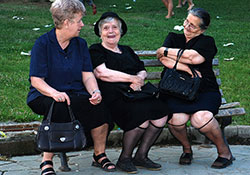Activities

Malin Bring
WHO/Europe is committed to stepping up its work with Member States and other partners to support active and healthy ageing. Activities can be grouped into four areas:
- healthy ageing over the life-course
- supportive environments
- health and long-term care fit for ageing populations
- strengthening the statistical evidence base and research.
Life-course approach
The life-course approach promotes the mainstreaming of ageing into all relevant activities for health promotion and disease prevention, and greater coverage and accessibility of targeted priority interventions for older people. Initiatives focus on noncommunicable diseases, vaccine-preventable diseases, injury and mental health, with special attention to gender aspects of implementation. The aim is to help people adopt healthier behaviour earlier in life and adapt to age-associated changes with a focus on the crucial period of early old age (50 years and older).
Supportive environments
A supportive environment in the community provides important social determinants for healthy ageing. WHO/Europe guides an increasing number of cities and communities in devising strategies for becoming more age friendly. This involves making the built environment and public transportation more accessible and conducive to physical activity, fostering social participation and social inclusion, and ensuring older people’s access to information.
Health and long-term care
To facilitate the exchange of information and good practice, WHO/Europe has established a Subnetwork on Healthy Ageing within the European Healthy Cities Network, and provides guidance to Member States in developing profiles of healthy ageing. These gather sound evidence for policy decisions related to ageing. WHO/Europe gives special attention to the participation of older people in the design of age-friendly community policies and to positive features of ageing, such as older people’s capacity to be an asset for their families, communities and economies.Many health systems are not well equipped to provide adequate services and mechanisms for the financial and social protection of growing numbers of older people. As part of efforts to strengthen health systems in the European Region, WHO/Europe works with Member States to help them incorporate healthy ageing policies in their social and health care strategies. This includes better coordination of care; anticipating gaps in the health workforce and taking steps to make public funding for health systems more sustainable.
Evidence base and research
Knowledge on the health and social trends of ageing populations and evidence of good practice in tackling the associated challenges are essential for policy development. Although much progress has been made in research and good-practice exchange over the past 10 years, gaps remain in the evidence for policy in the WHO European Region. WHO/Europe therefore aims to identify the most important gaps in research and to strengthen its technical capacity and that of Member States to monitor and evaluate the health and functional status of older people and their access to health and social services.



